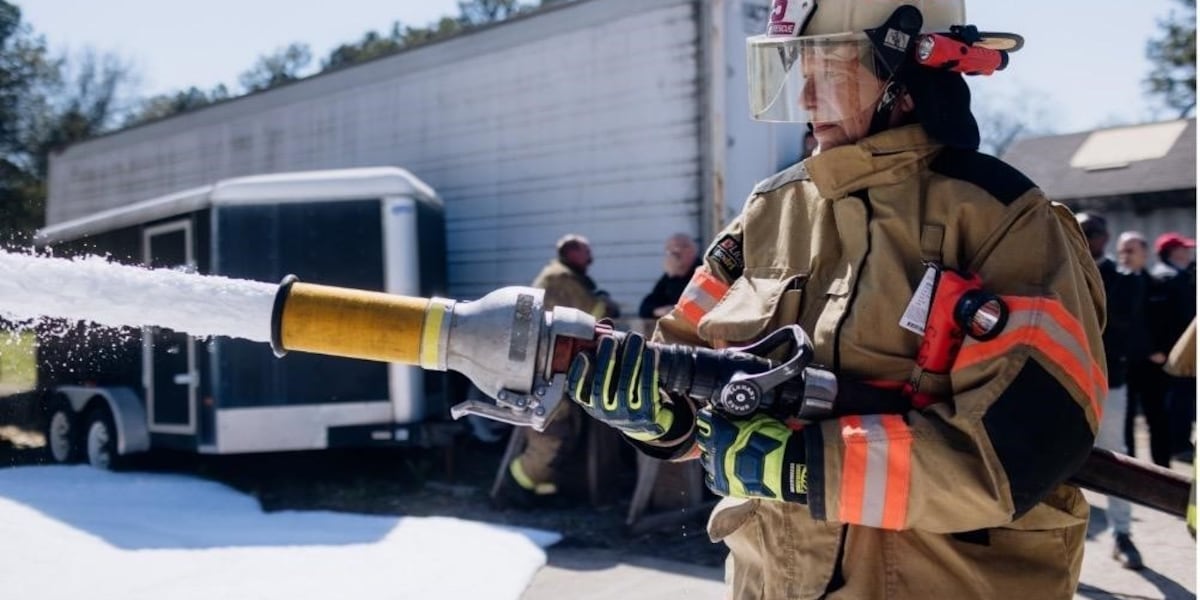California
CA lawmakers approve nation’s most sweeping emissions disclosure rules for big business

SACRAMENTO, Calif. — Major corporations from oil and gas companies to retail giants would have to disclose their direct greenhouse gas emissions as well as those that come from activities like employee business travel under legislation passed Monday by California lawmakers, the most sweeping mandate of its kind in the nation.
The legislation would require thousands of public and private businesses that operate in California and make more than $1 billion annually to report their direct and indirect emissions. The goal is to increase transparency and nudge companies to evaluate how they can cut their emissions.
“We are out of time on addressing the climate crisis,” Democratic Assemblymember Chris Ward said. “This will absolutely help us take a leap forward to be able to hold ourselves accountable.”
UN releases alarming report on greenhouse gas emissions
The legislation was one of the highest profile climate bills in California this year, racking support from major companies that include Patagonia and Apple, as well as Christiana Figueres, former executive secretary of the United Nations convention behind the 2015 Paris Climate Agreement.
The bill received 41 votes in the Assembly, just enough to pass and send it back to the Senate for a final vote before it would reach Democratic Gov. Gavin Newsom. Lawmakers backing the bill say a large number of companies in the state already disclose some of their own emissions. But the bill is a controversial proposal that many other businesses and groups in the state oppose and say will be too burdensome.
Newsom declined to share his position on the bill when asked last month. His administration’s Department of Finance opposed it in July, saying it would likely cost the state money that isn’t included in the latest budget. Newsom has advanced California’s role as a trendsetter on climate policies by transitioning the state away from gas-powered vehicles and expanding wind and solar power. By 2030, the state has set out to lower its greenhouse gas emissions by 40% below what they were in 1990.
State Sen. Scott Wiener, a San Francisco Democrat who introduced the disclosure bill, said in a statement that it would allow California to “once again lead the nation with this ambitious step to tackle the climate crisis and ensure corporate transparency.”
California has a lot of big companies that export everything from electronics to transportation equipment to food, and most every major company in the country does business in the state, which is home to about one in nine Americans. Newsom often boasts about the state’s status as one of the world’s largest economies.
The policy would require more than 5,300 companies to report their emissions, according to Ceres, a nonprofit policy group supporting the bill.
About 17 states, including California, have inventories requiring large polluters to disclose how much they emit, according to the National Conference of State Legislatures. California’s climate disclosure bill would be different because of all the indirect emissions companies would have to report. Additionally, companies would have to report based on how much money they make, not how much they emit.
The U.S. Securities and Exchange Commission proposed rules that would make public companies disclose their emissions, up and down the supply chain. But the California bill would go beyond that, by mandating that both public and private companies report their direct and indirect emissions.
Vulnerable groups will be most impacted by climate change, EPA says
The legislation would make large companies disclose their own greenhouse gas emissions and emissions released indirectly from sources including employee business travel, the transport of products and waste disposal. For example, a major retailer would have to report emissions from powering its own buildings, as well as those that come from delivering products from warehouses to stores.
Opponents of the bill say it is not feasible to accurately account for all of the mandated emissions from sources beyond what companies are directly responsible for.
“We’re dealing with information that’s either unreliable or unattainable,” said Brady Van Engelen, a policy advocate at the California Chamber of Commerce.
The chamber, which advocates for businesses across the state, is leading a coalition that includes the Western States Petroleum Association, the California Hospital Association and agricultural groups, in opposing the bill. They argue many companies don’t have enough resources or expertise to accurately report emissions and say the legislation could lead to higher prices for people buying their products.
Hundreds of companies in California already have to disclose their direct emissions through the state’s cap and trade program, said Danny Cullenward, a climate economist and fellow at the University of Pennsylvania’s Kleinman Center for Energy Policy. The decade-old program, which allows large emitters to buy allowances from the state to pollute and trade them with other companies, is one of the largest in the world.
Here’s how Bay Area researchers are using plants to fight climate change
Cullenward said the disclosure bill could lead to similar proposals in other states as federal regulators, faced with possible lawsuits in the future over disclosure mandates, “are going to be under pressure to not overreach.”
Supporters of the disclosure bill acknowledge it’s not a “perfect” solution that would guarantee flawless emissions reports. But they say it’s a starting point. California Environmental Voters, which supports the bill, says the legislation would put pressure on companies to move faster in lowering their emissions.
“Our state can’t just take 2023 off in terms of climate action,” said Mary Creasman, the group’s chief executive officer.
The California Air Resources Board would have to approve regulations by 2025 to implement the bill’s requirements. Companies would have to begin publicly disclosing their direct emissions annually in 2026 and start annually reporting their indirect emissions starting in 2027. Companies would have to hire independent auditors to verify their reported emissions releases.
A similar proposal introduced last year passed the state Senate but failed in the Assembly. Wiener, the San Francisco Democrat who introduced the legislation both years, has said proponents of the bill built a stronger coalition this year to have a better outcome.
A key committee in the state Assembly blocked legislation earlier this year that would have sped up the state’s timeline for reducing greenhouse gas emissions. Lawmakers are also weighing a bill that would require companies making more than $500 million to disclose how climate change could hurt them financially.
___
Sophie Austin is a corps member for the Associated Press/Report for America Statehouse News Initiative. Report for America is a nonprofit national service program that places journalists in local newsrooms to report on undercovered issues. Follow Austin @sophieadanna

California
University of California police union blasts UCLA admin for 'lack of response' to violence at campus protests
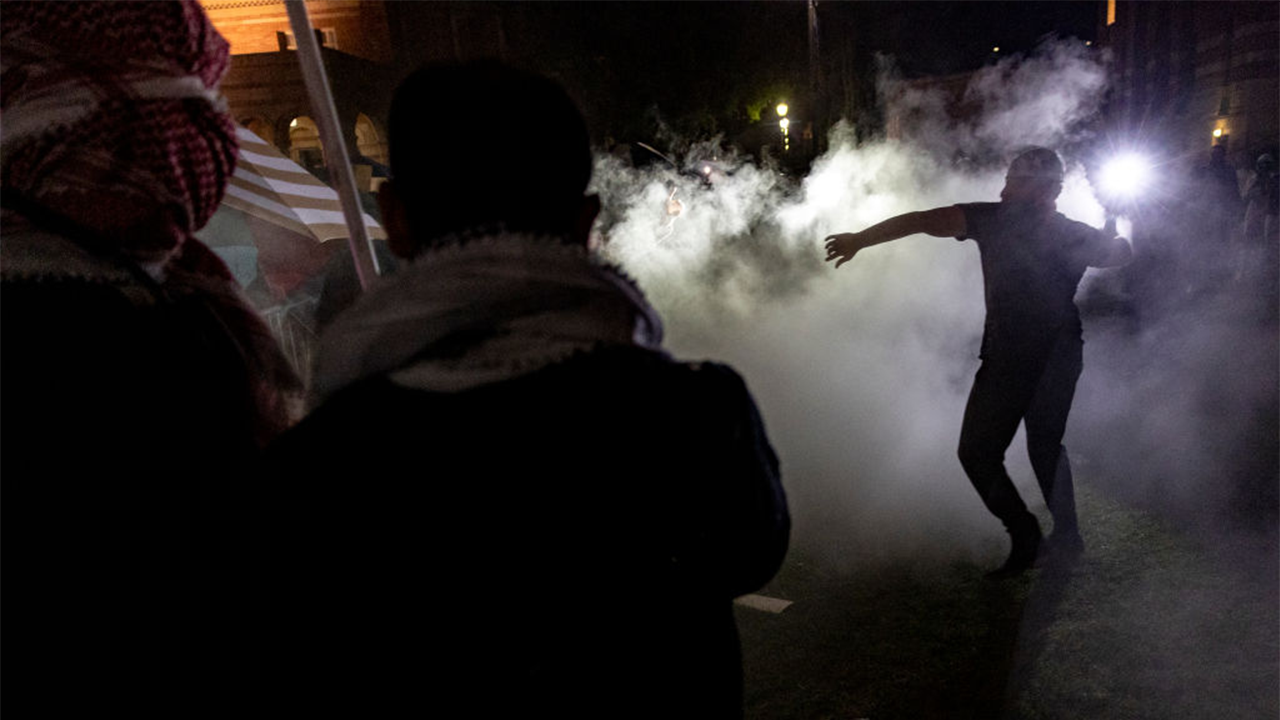
The police union representing officers at University of California schools is criticizing UCLA administrators for the “lack of response” to violence that broke out at anti-Israel student protests on campus last week.
The union also called for an independent investigation into the response.
“UC administrators are solely responsible for the University’s response to campus protests, and they own all the fallout from those responses,” Federated University Police Officers Association president Wade Stern said in a press release Saturday.
Hundreds of pro-Palestine demonstrators set up an encampment on UCLA’s campus in Royce Quad last week to demand that the university divest from companies and institutions that are “complicit in the Israeli occupation, apartheid, and genocide of the Palestinian people.”
UCLA STUDENT SLAMS UNIVERSITY FOR ‘ENCOURAGING VIOLENCE,’ TURNING CAMPUS INTO ‘WAR ZONE’: ‘THIS IS A DISGRACE’
Police at UCLA were given permission to clear a massive anti-Israel demonstration. (Photo by ETIENNE LAURENT/AFP via Getty Images)
Early Wednesday morning, pro-Israel counter-protesters attacked the encampment, which started a clash between them and the anti-Israel protesters, Fox 11 reported. Fights broke out, fireworks were shot at demonstrators and items were thrown as part of the violence.
Law enforcement initially stood by while the violence unfolded, according to Fox 11. Local police in riot gear did not respond to the scene until hours later. Law enforcement eventually moved in and cleared the encampment, and more than 200 protesters were arrested.
“”In the end, the encampment on Royce Quad was both unlawful and a breach of policy.,” UCLA Chancellor Gene Block said in a statement Thursday. “It led to unsafe conditions on our campus and it damaged our ability to carry out our mission. It needed to come to an end.”
Students told Fox 11 they were frustrated about the lack of response by the university. One security guard on campus said UCLA “could have stopped this a long time ago.”
California Gov. Gavin Newsom, a Democrat, condemned the violence and called for an investigation into the university’s response.
UCLA FALLS TO ANARCHY AFTER COUNTERPROTESTERS CONFRONT ANTI-ISRAELI ENCAMPMENT: ‘HORRIFIC ACTS OF VIOLENCE’
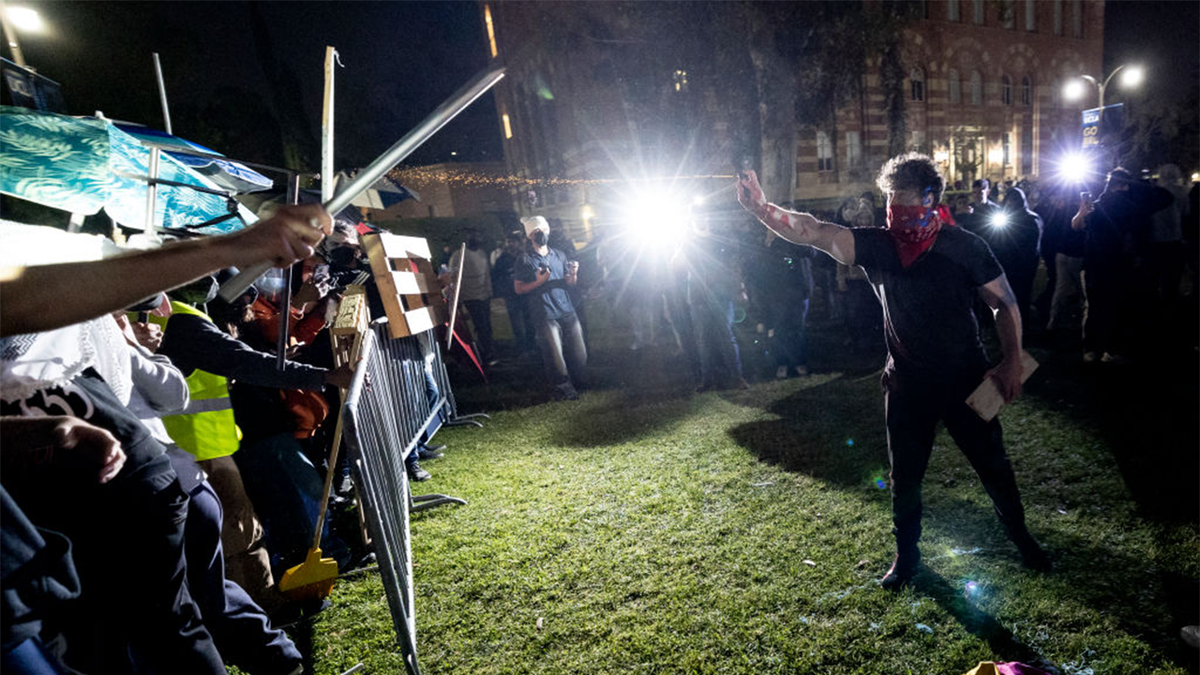
Clashes broke out on May 1, 2024, around pro-Palestinian demonstrations at the University of California, Los Angeles, as universities around the United States struggle to contain similar protests on dozens of campuses. (ETIENNE LAURENT/AFP via Getty Images)
University of California President Michael Drake said in a statement Wednesday that he has “requested a detailed accounting from the campus about what transpired” and that he is “ordering an independent external review of both UCLA’s planning and actions, and the effectiveness of the mutual aid response.”
The police union said in its statement Saturday that the investigation will “undoubtedly uncover multiple failures to implement and adhere to UC’s own guidelines for response to campus protests.”
According to the union, University of California policy states that each school is responsible for establishing a task force to respond to student protests on campus, but that those task forces have not been trained since 2020. The union said the University of California and its campuses “have not funded any training.”
CALIFORNIA STATE OFFICIALS CONDEMN VIOLENT ANTI-ISRAEL PROTESTS AT UCLA
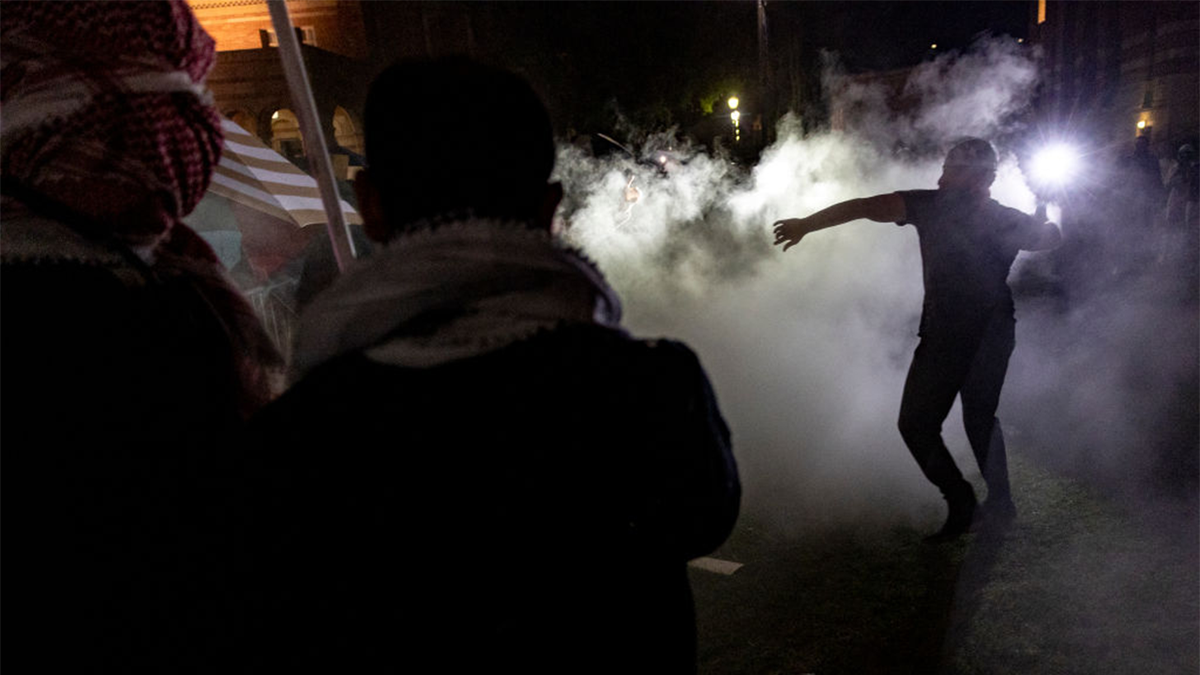
Counter-protesters attack a pro-Palestinian encampment set up on the campus of the University of California Los Angeles (UCLA) as clashes erupt, in Los Angeles on May 1, 2024. (ETIENNE LAURENT/AFP via Getty Images)
CLICK HERE TO GET THE FOX NEWS APP
The union also claimed that administrators told campus police to “stand down and stand aside” during the campus protests. The union said a Jewish student who called police asking for help because he was being blocked from a campus library was told by the dispatcher that administrators had told campus police not to intervene.
“The UCLA administration has much to answer for in the upcoming probe, and their adherence to established guidelines should play a central part,” the union’s statement said.
California
California Man Indicted For Allegedly Making Threats To Georgia Prosecutor In Trump Election Case

ATLANTA (AP) — A California man has been indicted by a federal grand jury in Atlanta for sending death threats to District Attorney Fani Willis, who is overseeing the prosecution of former President Donald Trump and 18 others on charges of illegally trying to overturn the 2020 presidential election in Georgia.
Marc Shultz, 66, of Chula Vista, is facing charges of transmitting interstate threats to injure Willis. Prosecutors alleged that Shultz posted comments to YouTube livestream videos in October 2023 that threatened Willis, including stating that the prosecutor “will be killed like a dog.”
“Sending death threats to a public official is a criminal offense that will not be tolerated,” Ryan Buchanan, the U.S. attorney in Atlanta, said in a statement Friday.
The April 24 indictment was unsealed Thursday. A federal public defender listed as representing Shultz didn’t immediately return emails seeking comment.
Records show Shultz appeared before a judge in San Diego on Thursday and was released on bail. Buchanan said Shultz would be formally arraigned in Atlanta in June.
Also Friday, Fulton County leaders testified before a special state Senate committee that they had no legal power to control Willis’ spending or her hiring of former special prosecutor Nathan Wade.
The Republican-led committee is probing Willis’ hiring of Wade to lead the team that investigated and charged Trump, lawyers and other aides in the Georgia case. Willis and Wade have acknowledged a romantic relationship with each other.
Trump and some other defendants in the case have tried to get Willis and her office removed from the case, saying the relationship with Wade created a conflict of interest.
Wade stepped down from the prosecution after Fulton County Superior Court Judge Scott McAfee in March found that no conflict of interest existed that should force Willis off the case. But he ruled that Willis could continue prosecuting Trump only if Wade left. Trump and others are appealing that ruling to a higher state court.
The allegations that Willis had improperly benefited from her romance with Wade resulted in tumultuous months in the case as intimate details of Willis and Wade’s personal lives were aired in court in mid-February. The serious charges in one of four criminal cases against the Republican former president were largely overshadowed by the love lives of the prosecutors.
ALEX SLITZ via Getty Images
Willis told reporters Friday that she had done nothing wrong.
“They can look all they want,” Willis said. “The DA’s office has done everything according to the books. We are following the law. I’m sorry that folks get mad when everybody in society can be prosecuted.”
Willis is running for reelection this year and faces a Democratic opponent, Christian Wise Smith in a May 21 primary. Early voting for that election is ongoing.
But the lawyer who initiated the effort to remove Willis, Ashleigh Merchant, has also claimed that Wade’s firing violated a state law that required approval of the hiring of a special prosecutor by the county commission.
Fulton County Commission Chairman Rob Pitts, a Democrat, and Fulton County Attorney Soo Jo both told the committee that while the law appears to require county commission approval, judges decades ago interpreted the law in such a way to give Willis the freedom to hire who she wants without approval. Jo, who represents the commission, cited three separate Georgia Court of Appeals cases backing up that point
“What I have found is that the court has rejected the proposition that this particular statute requires a district attorney to obtain explicit permission from a county prior to appointing a special assistant district attorney,” Jo said.
State Sen. Bill Cowsert, the Athens Republican who chairs the committee, disputed that interpretation when questioned by reporters after the hearing.
“I think the clear language of the statute says that that requires county approval, and especially where it’s funded by the county,” Cowsert said.
He went on to suggest the committee, which doesn’t directly have the power to sanction Willis, might change the law to give counties more control over spending by state officers funded by counties, including district attorneys and sheriffs. Fulton County officials said they don’t believe they currently can control how Willis spends money once it’s appropriated to her.
Cowsert said increased county oversight would be “extraordinarily complex” for district attorneys managing funds contributed by more than one county. While Willis and 15 other district attorneys in Georgia only prosecute cases from one county, others prosecute cases from as many as eight counties.
Senate Democratic Whip Harold Jones II of Augusta said the hours of questioning over details of how Fulton County budgets money shows the panel is “on its last legs,” noting three of six Republicans didn’t appear for a committee meeting called on short notice.
“They’re not even interested in this anymore,” Jones said. “There’s nothing else to talk about, quite frankly. And we found that out today.”
California
California Man Charged With Sending Death Threats to Fani Willis
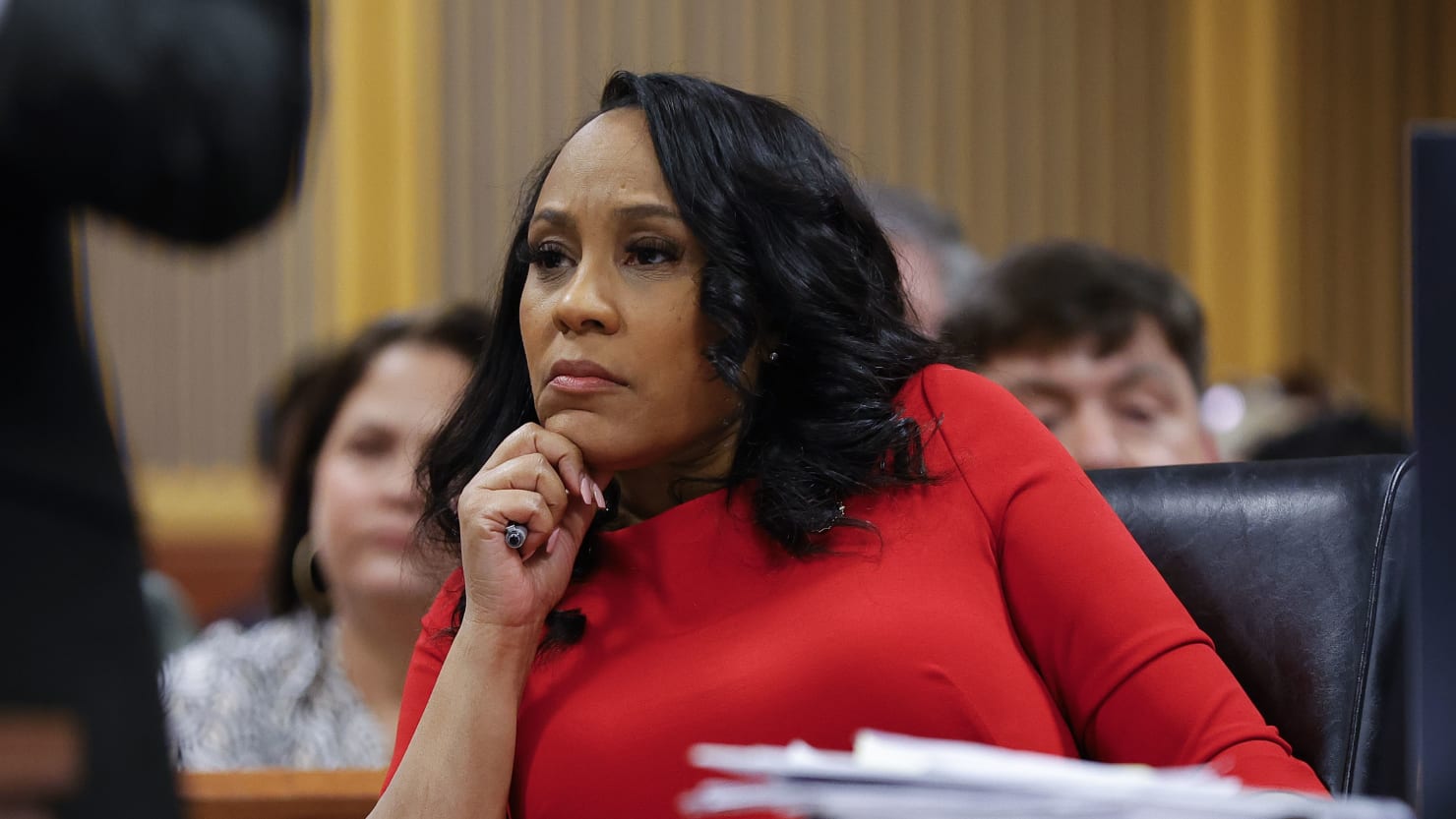
A southern California man was charged with sending death threats to Fulton County district attorney Fani Willis over her prosecution of Donald Trump, the U.S. Attorney’s Office in the Northern District of Georgia announced Friday.
Marc Shultz, 66, of Chula Vista, made his first federal court appearance in San Diego on Thursday, the U.S. Attorney’s Office said in a statement. He had been indicted by a federal grand jury on April 24 and will be formally arraigned in Atlanta in June.
Shultz allegedly threatened Willis’ life in several comments posted to YouTube livestream videos on Oct. 4 and Oct. 5, vowing to violently murder her. In the comments, he lobbed racial slurs at the D.A. and said she “will be killed like a dog,” according to the indictment and the U.S. Attorney’s release.
Willis, who is prosecuting Trump for alleged attempts to overturn the 2020 election in Georgia, has been the target of racist threats since Trump’s indictment in August. Trump himself has been relentless in his criticism of her, launching both personal attacks and plain falsehoods.
“Threats of violence against government officials, specifically, threaten the very fabric of our democracy,” Keri Farley, Special Agent in Charge of FBI Atlanta, said. “We want everyone to know that if you engage in such behavior, you will be held accountable to the fullest extent of the law.”
In a statement, Willis thanked the U.S. Attorney in Northern Georgia for bringing the indictment and made a dig at Republican state Senator Bill Cowsert, who is investigating Willis for misconduct.
“On the same day Senator Bill Cowsert had the audacity to question whether an elected African American female District Attorney deserves protection from death threats, the United States Attorney and the FBI announced another indictment of someone who threatened my life,” Willis said.
“I thank US Attorney Ryan Buchanan, his staff and the FBI for believing the life of an African American elected official has value and for their diligent efforts in ensuring the safety of myself, my staff, and our families.”
Willis has faced the Trump team’s sustained attempts to oust her over an affair she had with a former special prosecutor, Nathan Wade, who she hired to lead the case. Judge Scott McAfee ultimately ruled that Willis could stay, on the condition that Wade would leave the case. Wade resigned shortly afterward.
Shultz’s threats were made months before Willis’ affair was uncovered.
-

 News1 week ago
News1 week agoFirst cargo ship passes through new channel since Baltimore bridge collapse
-

 World1 week ago
World1 week agoHaiti Prime Minister Ariel Henry resigns, transitional council takes power
-

 Movie Reviews1 week ago
Movie Reviews1 week agoAbigail Movie Review: When pirouettes turn perilous
-

 World1 week ago
World1 week agoEU Parliament leaders recall term's highs and lows at last sitting
-

 Politics1 week ago
Politics1 week ago911 call transcript details Democratic Minnesota state senator’s alleged burglary at stepmother's home
-

 Science1 week ago
Science1 week agoOpinion: America's 'big glass' dominance hangs on the fate of two powerful new telescopes
-

 Politics1 week ago
Politics1 week agoGOP lawmakers demand major donors pull funding from Columbia over 'antisemitic incidents'
-

 World1 week ago
World1 week agoHamas ‘serious’ about captives’ release but not without Gaza ceasefire






